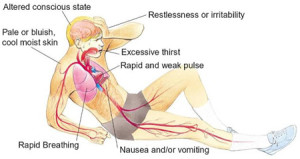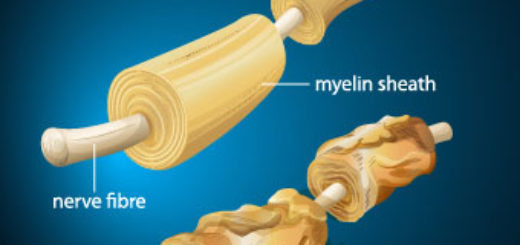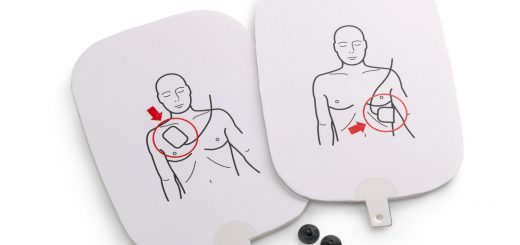What is Shock in First Aid?
What is shock in medical terms? The best way to describe shock is that the body has lost blood (or another fluid) which carries oxygen around the body. If this blood is lost, sufficient oxygen will not reach the brain and vital organs, which can lead to coma and eventually death.
The body does try to compensate by speeding up breathing and pulse, and diverting blood into the “core” of the body. Your aim as a first aider is to stop blood loss and help restore blood supplies to the brain.
So what signs and symptoms of shock should you look out for as a first aider?
What is Shock?
Shock can be defined as a medical condition which occurs when there is insufficient blood flow throughout your body. It can be life-threatening and is often a part of certain illnesses or severe injuries.
Medical shock could lead to other medical conditions, such as organ damage, heart attack, or hypoxia, which is a condition where the tissues in the human body don’t receive a sufficient amount of oxygen.
When a person experiences shock, several of their body organs could get damaged in the process. The condition can worsen rapidly and requires immediate medical attention.
What Causes Shock?
Shock can be caused by numerous medical conditions, such as:
- Low blood volume
- Damage to your nervous system
- Heart problems
- Changes in blood vessels, such as dilation or excessive widening of your blood vessels.
- Certain medicines that highly impact and reduce heart function
- When the pumping action in the heart is inadequate
Types of Shock
There are different types of shock, and they are as follows:
Hypovolemic Shock
When there is low blood volume, that’s when hypovolemic shock occurs. Low blood volume entails that the amount of blood which enters the heart of a human being per heartbeat is lower than the normal amount. Therefore, the amount of blood pumped out is lower than normal as well.
This type of shock could be caused due to:
- Excessive external bleeding from cuts or other kinds of injuries.
- Severe dehydration.
- Loss of bodily fluids due to diarrhea, severe vomiting, a hole in your intestinal wall, untreated diabetes, excessive use of diuretics, inflammation of your pancreas, or major burns.
- Severe internal bleeding caused due to an ectopic pregnancy (ruptured pregnancy outside of the uterus), a ruptured blood vessel, or an ulcer.
Cardiogenic Shock
When your heart gets damaged in a manner such that it can no longer pump the sufficient amount of blood required by the body, it leads to a cardiogenic shock. The causes of it are:
- Malfunction of a heart valve.
- A heart valve having an infection or a tear.
- Abnormal heart rhythm.
- Heart attack.
- An infection or rupture of the heart muscle.
Obstructive Shock
When a blockage in your veins, arteries, or heart prevents proper blood flow, it could lead to an obstructive shock. This kind of shock can also take place due to a fluid buildup in your chest cavity. The causes of it could be:
- Blood clot in the lungs.
- Buildup of fluid or blood in the space between the heart muscle and outer heart sac.
- When there is air trapped between the chest wall and the lung.
Distributive Shock
When your blood vessels widen excessively, it can lead to a distributive shock. This lowers your blood pressure, with your organs not receiving enough oxygen and blood. The other causes of it are certain endocrine disorders, brain injuries, and drug overdose. The various types of distributive shock include:
- Anaphylactic shock: Anaphylactic shock occurs when there is a severe allergic reaction.
- Neurogenic shock: Neurogenic shock is caused by damage to a person’s nervous system, which results from a spinal cord injury.
- Septic shock: Septic shock takes place when there is a severe bacterial infection in the bloodstream.
General signs and symptoms of shock
- Cold, clammy skin
- Rapid shallow breathing
- Rapid, weak pulse
- Thirsty
- Changing level of consciousness
- Low blood pressure
- Yawning (air hunger)
- Slow capillary refill time
Use this in association with what you know of the casualty’s injury: someone who has the signs and symptoms of shock along with a history of a hard blow in the stomach may be suffering from internal abdominal bleeding and hence shock.
First aid Treatment of Shock
Generally, there is not much you can do to reverse shock, but you can slow it down enough to get the casualty to medical help. The usual treatment is:
- Treat any cause (eg: attempt to stop bleeding)
- Constantly reassure the casualty
- Lay casualty down on a blanket and raise legs to help keep blood in core
- Keep the casualty warm
- Loosen any tight clothing
- Get urgent medical help
- Monitor pulse and respiratory rate
How Long Does Shock Last?
The duration of a shock depends on the kind of shock a person is experiencing and how quickly they receive medical attention. A shock could lead to long-term effects.
Can Shock be Prevented?
Certain cases and forms of shock are preventable. Listed below are some steps you can take to prevent yourself from experiencing a shock:
- If you have severe allergies, take all the precautions to avoid your triggers. Make sure to carry an epinephrine auto-injector with you and use it at the very onset of an anaphylactic reaction.
- Drink plenty of fluids to stay hydrated, and this is especially vital if you live in humid or hot climates.
- Blood loss can often occur from injuries, and in order to prevent that from happening, ensure to wear protective gear whenever you’re riding a bike, taking part in contact sports, or using dangerous equipment. Also, remember to put on your seatbelt every time you’re in a vehicle.
- To reduce the risk of heart damage, engage in regular exercise, follow a balanced diet, and stay away from smoking and secondhand smoke.
FAQs
What are the causes of shock?
The causes of shock include burns, poisoning, dehydration, heart failure, severe blood loss, severe allergic reaction, and blood infections.
What are the symptoms of shock?
Some of the symptoms of shock are confusion, chest pain, dizziness, anxiety, bluish fingernails and lips, profuse sweating, and pale and clammy skin.
What are some of the methods to diagnose cardiogenic shock?
Certain methods used to diagnose cardiogenic shock include a chest X-ray, an electrocardiogram, and an echocardiography.
What are the prevention steps for shock?
Preventing shock also means preventing the causes associated with it, which entails preventing dehydration, injuries, heart disease, and so on. Avoiding anything that triggers your allergies is vital for this purpose. If you have been diagnosed with an allergy, remember to carry an epinephrine pen, which is something your doctor will prescribe to you.
Does shock cause vomiting?
Yes, vomiting is one of the symptoms of shock.
How long does shock last?
A shock can last for a short time in some cases. In other cases, it can go on for hours or days.
Is fever a symptom of shock?
Yes, fever can be a symptom of shock.
Conclusion
If you believe that someone around you is experiencing shock, call the emergency medical services right away. Follow the first aid treatment for shock until the arrival of medical help.
Since shock is a serious condition which occurs when there isn’t enough oxygen flow to your body, it can cause your organs to not function properly.
Shock can often be the main cause of death for people who are severely injured or ill. Therefore, if you find someone suffering from shock, you must call for medical help immediately.






